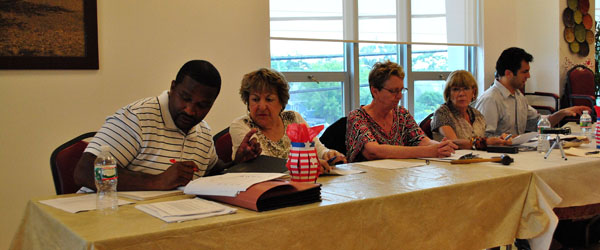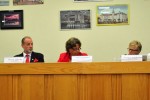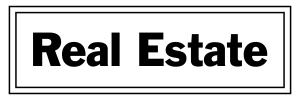Directly-elected mayor, staggered terms recommended
Proposed changes to city's form of government on November ballot
A directly-elected mayor, staggered terms and run-off elections are among the recommendations the city’s charter study commission [above] will submit to Asbury Park voters in a referendum this November.
Also in the package of changes is moving the municipal election from May to November. If voters approve the recommendations, new elections will take place next year — cutting short the four year term of the current council that was sworn in on July 1.
After working on the recommendations for several months — the five members of the charter study commission were elected in November — the commission agreed at its Monday night meeting on the ballot question to submit to voters, according to Pam Lamberton, chairperson of the commission.
Voters will vote on the package of recommendations as a whole. Lamberton and commission members Duanne Small, Rita Marano and MIchele Maguire voted in favor of submitting the recommendations to the voters, Lamberton said. The fifth commissioner — Randy Thompson — did not support the package, she said.
“I think at times people viewed our process as organized chaos,” Lamberton said. “But at the end, people said they appreciated the openness and transparency of the process. And that they could participate in the meetings, and that we’d actually listen to them.”
The commission will have a meeting this coming Monday, August 5, at City Hall at 7 p.m. to hand out their report on its recommendations, and discuss the proposed changes with the public, Lamberton said. The commissioners will also set up a forum at a later date to explain the proposals, as well as speak about them to various civic groups, she said.
The commission had tentatively agreed on recommending a “strong mayor” form of government, in which a directly-elected mayor is given the executive power and wide discretion to hire key personnel. After numerous objections at the commission meetings from the public — as well as sustained opposition from commission member Rita Marano who questioned concentrating that much power in one person — the commission opted to keep the mayor as a member of the council, Lamberton said.
However, unlike the current system where the city council appoints the mayor, in the proposed new form of government the mayor would be directly elected by the voters. The mayor’s main responsibility would be presiding over the council meetings, as in the city’s current form of government.
The commission decided to keep intact the basic administrative structure of the city government — where the city manager is the chief executive officer answering to a city council that sets policy. The city manager will continue to run the municipal government’s day-to-day operations.
The city currently elects all five council members to four year terms at a non-partisan election in May. The top five vote getters win, regardless of whether they obtain a majority of votes.
The number of council members would remain at five, but the commission wants to stagger their terms so an election is held every two years, with the mayor and two council members up for election at one time, and the other two council members up at another. Terms would stay at four years.
The elections would also be moved from May to November, which was strongly advocated by commissioner Duanne Small. The commission had tentatively agreed to keep the elections in May. But Small convinced his colleagues to recommend the move in order to boost the low turnout in May when only the Asbury city council election is on the ballot. Turnout is significantly higher in November, particularly for the presidential election.
Run-off elections, advocated by commissioner Michele Maguire, would be a new feature to Asbury’s municipal election. In the election for mayor, if no candidate gets a majority of the vote, a run-off election of the top two vote-getters would be held a month later. That prevents candidates from winning with only a small percentage of the electorate in a crowded field of candidates, run-off proponents have argued.
Small, at a commission meeting earlier this month, announced his support for the run-offs because it encourages candidates to reach out to everyone in the electorate.
With the elections for the remaining four council members, a run-off would occur if no candidate gets a majority. Since two council seats will be up at a time, if one of the candidates for the seats gets a majority, the election would be over and the top two vote-getters would win. If no one gets a majority, the top four vote getters would compete in a run-off four weeks later for the two seats.
In this past May’s city council election, twenty two candidates competed for the five council seats. While 1,890 voters cast ballots that were counted, no candidate received a majority. The vote of the five winning candidates ranged from 723 to 620. There were 8,840 voters eligible to vote in the May election, city clerk Steve Kay previously told the Sun. That put the turnout at approximately 21 percent. An additional 332 voided vote by mail ballots are the subject of a pending lawsuit by an unsuccessful candidate seeking to open them.
The following is the question that will be placed on the November ballot for voter consideration, according to Lamberton:
“Shall the COUNCIL/MANAGER PLAN of the Optional Municipal Charter Law, providing for FIVE (5) COUNCIL MEMBERS to be ELECTED AT LARGE for STAGGERED terms at NON-PARTISAN elections held in NOVEMBER, with the MAYOR DIRECTLY ELECTED BY THE VOTERS, WITH RUN-OFF ELECTIONS to be held thereafter if a sufficient number of candidates fail to attain a majority of votes be adopted by THE CITY OF ASBURY PARK.”
If voters approve this question, at the November election next year voters would elect the new mayor and four new members of council. Under the law, when the four new council members are seated, they will then “by lot” — which can actually mean drawing straws — determine who will have four year terms, and who will start with two year terms, Lamberton said.
Those with two year terms will face reelection in the next cycle, and after that the term for those two seats will be four years, she said. That will then set up the staggering of the terms.
[Pictured above are, left to right, charter study commissioners Duanne Small, Rita Marano, Pam Lamberton, Michele Maguire and Randy Thompson.]
————————————————————
Follow the Asbury Park Sun on Facebook and Twitter.















